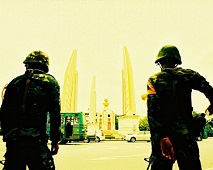
Class War: Thailand’s Military Coup
Outnumbered by the country's rural voters, Thailand's once vibrantly democratic urban middle class has embraced an elitist, antidemocratic agenda.

Outnumbered by the country's rural voters, Thailand's once vibrantly democratic urban middle class has embraced an elitist, antidemocratic agenda.

The struggle over the meaning of one man’s killing spree may prove to be a watershed moment in the history of feminism, which always has been and still is in a struggle to name and define, to speak and be heard. “The battle of the story” the Center for Story-Based Strategy calls it, because you win or lose your struggle in large part through the language and narrative you use.

Source: The Guardian Unlimited
Around the world, calls for national autonomy have grown. Minorities are blamed but the real culprit is neoliberalism
The night in 2002 when Luiz Inácio Lula da Silva won his landslide victory in Brazil’s presidential elections, he warned supporters: “So far, it has been easy. The hard part begins now.” He wasn’t wrong. As head of the leftwing Workers’ party he was elected on a platform of fighting poverty and redistributing wealth. A year earlier, the party had produced a document, Another Brazil is Possible, laying out its electoral programme. In a section entitled “The Necessary Rupture”, it argued: “Regarding the foreign debt, now predominantly private, it will be necessary to denounce the agreement with the IMF, in order to free the economic policy from the restrictions imposed on growth and on the defence of Brazilian commercial interests.”

Source: Truthout
In the past several months, we have been provided with instructive lessons on the nature of state power and the forces that drive state policy. And on a closely related matter: the subtle, differentiated concept of transparency.
The source of the instruction, of course, is the trove of documents about the National Security Agency surveillance system released by the courageous fighter for freedom Edward J. Snowden, expertly summarized and analyzed by his collaborator Glenn Greenwald in his new book, “No Place to Hide.”

Source: Al Jazeera
The American military’s expansion to the continent poses significant challenges to democratization and domestic security
On May 5, President Barack Obama hosted his Djiboutian counterpart, Ismail Omar Guelleh, at the White House. The two leaders signed a 20-year lease agreement for the Djibouti-based Camp Lemonnier, the biggest U.S. military base in Africa. Covering 500 acres, the installation is a crucial launching site for U.S. military operations against militant groups in the Horn of Africa and Yemen. The U.S. agreed to pay an annual fee of $70 million for the site, which now hosts more than 4,000 U.S. military personnel and civilians.

Source: The Guardian Unlimited
Capitalists spread prosperity only when threatened by global rivalry, radical movements and the risk of uprisings at homeBack in the 90s, I used to get into arguments with Russian friends about capitalism. This was a time when most young eastern European intellectuals were avidly embracing everything associated with that particular economic system, even as the proletarian masses of their countries remained deeply suspicious. Whenever I’d remark on some criminal excess of the oligarchs and crooked politicians who were privatising their countries into their own pockets, they would simply shrug.
Copyright Toward Freedom 2019